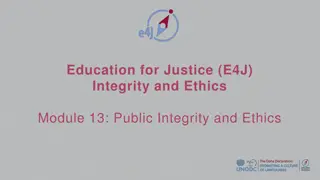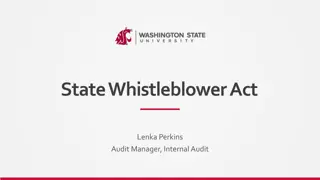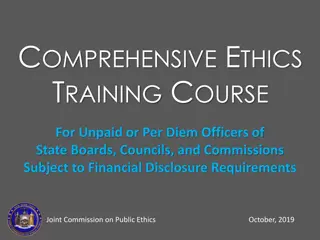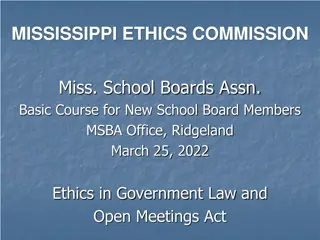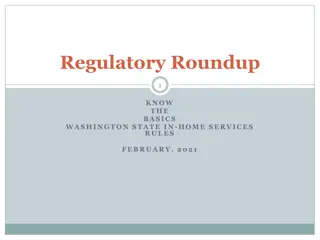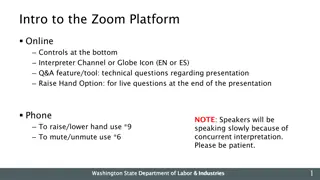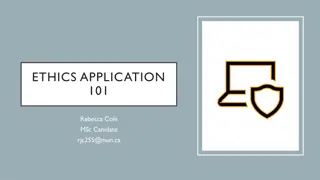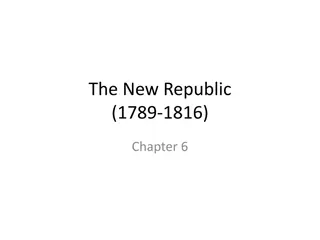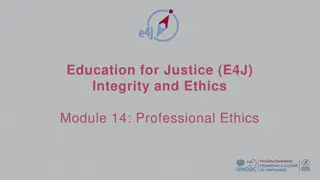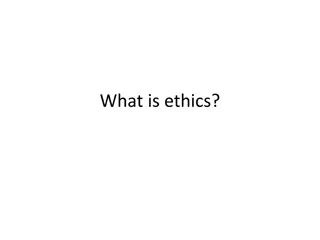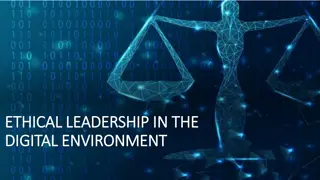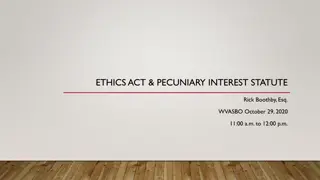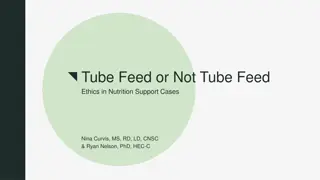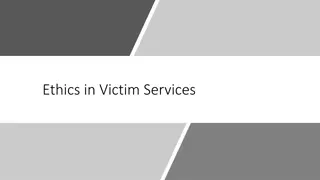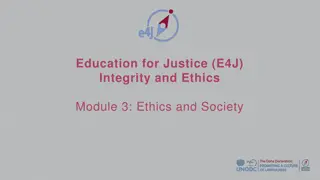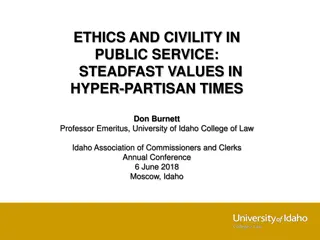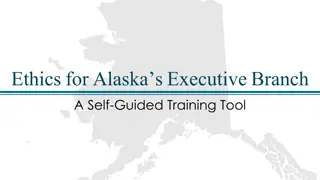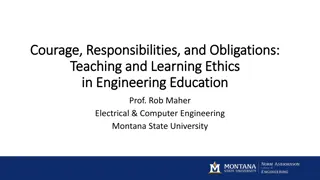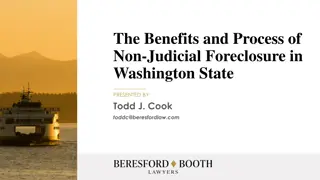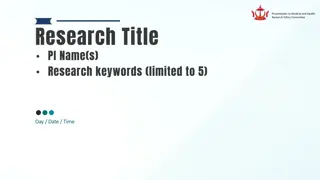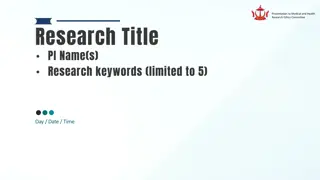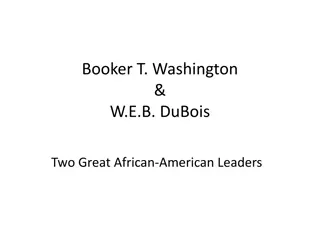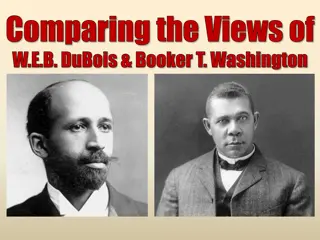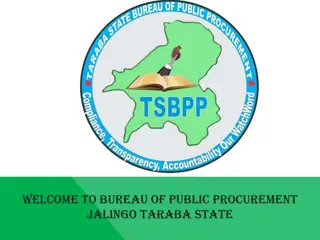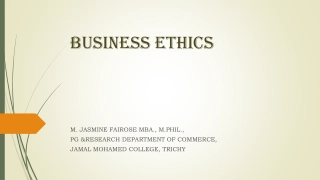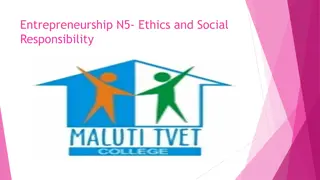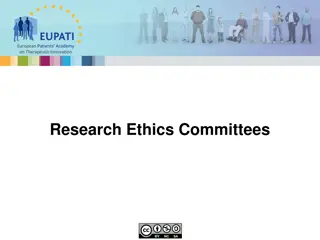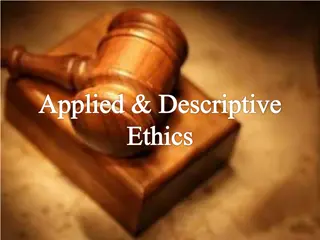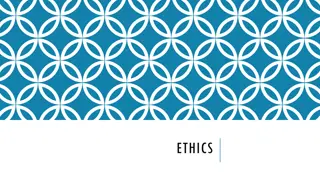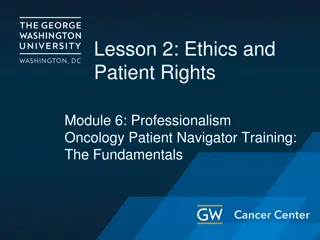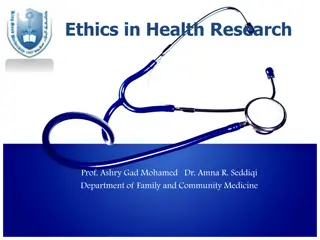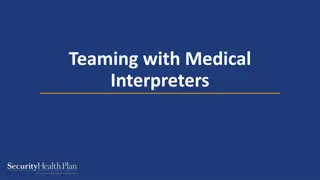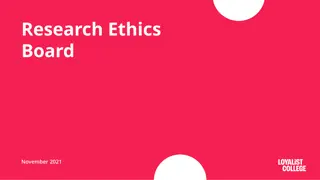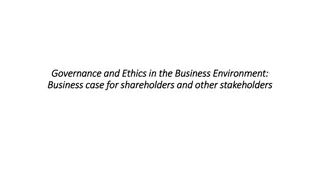Understanding Ethics in Public Service: Washington State Overview
This content discusses the role of WSU Division and the Office of the Attorney General in providing advisory opinions on state ethics laws and WSU policies. It further covers the Washington State Ethics Law, including key areas like conflict of interest, special privileges, outside compensation, and gift restrictions. Essential resources and sanctions are also highlighted.
Download Presentation

Please find below an Image/Link to download the presentation.
The content on the website is provided AS IS for your information and personal use only. It may not be sold, licensed, or shared on other websites without obtaining consent from the author. Download presentation by click this link. If you encounter any issues during the download, it is possible that the publisher has removed the file from their server.
E N D
Presentation Transcript
UNDERSTANDING ETHICS IN PUBLIC SERVICE Chapter 42.52 RCW WAC 292-110 BPPM/Executive Policies
Role of WSU Division, Office of the Attorney General Prohibited from providing personal legal advice Attorney for the State of Washington & provide advice to WSU Provide advisory opinions on state ethics laws and WSU policies
Washington State Ethics Law Covers the Following General Areas: Use of State Resources Gifts Conflicts of Interest, Including Outside Employment Compensation for Official Duties Nepotism & Special Privileges Political Activities Confidential Information Public Records
Overview of the State Ethics Law The standards established under the state s ethics law, RCW 42.52, are based on 4 key areas: FIRST: Conflict of Interest State employees should not have financial or other interests, or engage in business or professional activities that conflict with the performance of their official duties; SECOND: Special Privileges State officers and employees should not use their state positions to secure special privileges or exemptions for themselves or any other person;
THIRD: Outside Compensation State employees should not receive compensation from a source other than the State of Washington for the performance or non-performance of an official duty; FOURTH: Gift Restrictions State employees should not receive a gift if it could be reasonably expected to influence or reward the performance of their official duties.
ESSENTIAL RESOURCES Executive Ethics Board (EEB) Web Page (www.ethics.wa.gov.) Ethics Act and Rules Advisory Opinions Training (On-line quiz) BPPM 10.21 ---Summary of Ethics Policies for the University BPPM 20.37 ---Personal use of University Resources Executive Policy 4 --- Electronic Communication Policy Executive Policy 27 ---Ethics & Conflicts of Interest
SANCTIONS AND PENALTIES Fines: Up to $5,000 or three times the benefit Damages sustained by the state plus costs Disciplinary action up to and including termination Negative publicity and perceptions of the violator, WSU, and the State of Washington Special Note: Every action taken by the Executive Ethics Board is a public record and published on line Personal Responsibility: Responsibility and accountability for the appropriate use of state resources ultimately rests with the individual state employee, or with the state employee who authorizes such work. WAC 292-110-010(1) In other words: Ignorance of the law won t work.
Use of State Resources State resources are to be used for the conduct of state business only The State s ethics law protects and limits the use of state resources for the conduct of official state business, with only narrow exceptions as determined by the EEB. State Resources Include: Equipment, computers, cell phones, cameras, general supplies Office/Conference rooms and university facilities Vehicles Personnel, co-workers, and work time THE UNIVERSITY WIRELESS SYSTEM
De Minimis (minimal) Use Exception De Minimis: Personal Use of state resources May be allowed if the use results in: No Cost to the State Does not Interfere with the performance of official duties, and Is Brief in duration and accumulation WAC 292-110-010 HOWEVER: State resources May Never be used to: Support an outside business (either profit or nonprofit unless approved by WSU) Private use of state property away from WSU For Commercial Activities (ads, sales, or solicitations) For Political Activities -- Campaigning for/against candidates or initiatives or lobbying Any use prohibited by law or WSU policy In these situations, the de minimis use exception will not apply.
State Resources & De Minimis Use: Day-to-Day Examples Phones: Landline local calls for reasonable personal business are permitted, i.e. medical & dental appointments, child care, transportation, etc. Long distance must be placed on personal phone. Agency Cell Phones: Generally limited to business purposes but De Minimis will likely apply. (Don t use it as your everyday cellphone.) Note: Reimbursing costs for use for will not mitigate the possible violation.
DAY TO DAY USE OF INTERNET Limited personal use of the internet is allowed so long as such use supports organizational effectiveness and does not undermine public trust. Computers/Software belong to the state State may access and monitor your office computer/lab top Anything you write, including email, may be subject to a possible public records request. It is acceptable to send brief private emails and forward emails to private computer as long as there is no cost to the state, is brief in duration, and does not interfere with duties. (This likely applies to state issued smart phones) DO NOT Use a state computer to listen to Internet Radio (exceptions may apply) Use a state computer to download music or upload a private play list The safe bet: Don t mix Smart-Phone and work computer
Executive Policy 4 Electronic Communication Policy Appropriate Use WSU s IT resources may be used for legitimate WSU purposes only. Appropriate use of IT resources are as follows: Use by faculty, administrators, and staff directly related to instruction, research, and scholarly, professional, and administrative endeavors on behalf of WSU that are within the scope of WSU employment. WSU IT resources shall not be used for: Conducting personal activities unrelated to any WSU or student educational purpose. Unless otherwise allowed by this policy see De Minimis Use. What does this all mean? Don t spend all day on ESPN picking a fantasy team Don t read the newspaper all day Do check it during the day to stay on top of things. Common sense, professional setting.
Social Media Use EP 4 Social Media Policy WSU may ask that employees maintain work-related, approved social media accounts or blogs Can be managed and updated during business hours Professional v. Private: personal networking sites should remain personal and not used for work-related purposes. No university account should be used to maintain personal social network accounts. Protect your WSU.EDU good name Any communication can become a public record Someone may be watching
RCW 42.52.140 GIFTS RULE: No state officer or state employee may receive, accept, take, seek or solicit, any thing of economic value as a gift or favor from a person if it could be: (1) reasonably expected that the gift or favor would influence the vote, action, or judgment of the officer or employee, or (2) be considered part of a reward for action or inaction.
GIFTS, GRATUITIES, & FAVORS When neither of these conditions are present, you may accept a gift or gifts up to $50 in value per calendar year. State ethics laws also provide for the acceptance of certain items that are either: 1. Not included in the definition of gift 2. Items that are gifts but are presumed not to influence
GIFTS BASICS GIFTS DO NOT INCLUDE: Items from family & friends with clear purpose not to influence Customary items related to an outside business Items exchanged at social events by coworkers Reasonable expenses for a speech or seminar Discounts available to individuals as a member of a broad-based group. Ex: Discount Mariner tickets for state employees
GIFTS BASICS $50 limit does not apply to: Flowers, plants, and floral arrangements Advertising and promotional items of a nominal value Plaques and awards Items received for professional evaluation Publications related to official duties Food and beverages at hosted receptions Admissions to charitable events Gifts from dignitaries Meals on infrequent occasion if related to official duties
What to do with a gift you cant accept? If someone gives you a gift you cannot accept you may, within 30-days: Return it to the sender Donate it to a charity Sometimes a gift may be accepted on behalf of an office or department. Make a record (essentially a receipt) of what you did with the gift and hold on to it.
GIFTS, RCW 42.52.150(4) Section 4 Employees SECTION 4 EMPLOYEES MEET ALL THREE CRITERIA: Work for an agency that seeks to acquire goods or services Gift-giving person seeks to provide goods or services to the agency Employee participates in those contractual matters with that gift-giving person If your duties include decisions about contracting or purchasing, the Sec. 4 restrictions apply to gifts from any past, current or potential future contactors or vendors
Sec. (4) Employees may NOT Accept Gifts If the gift giver has been or could ever be a party in a contracting relationship with you in your official capacity, do not accept the gift. There will be few, if any, times when it will be acceptable for you to accept any kind of gift. Certain exceptions apply, call AGO if you have a question
Sec. 4 Employees May Accept Advertising and promotional items of a nominal value Plaques and awards Items received for evaluation if not beneficial interest attaches Publications related to official duties Food and beverages at hosted receptions Admission to charitable events Items from family and friends Customary items related to outside business Items exchanged at social events by coworkers Items returned or donated to charity within 30 days Discounts available to individuals as members of broad-based group
CONFLICTS OF INTEREST RCW 42.52.020: No state employee may have an interest, financial or otherwise, direct or indirect, or engage in a business or transaction or professional activity, or incur an obligation of any nature, that is in conflict with the proper discharge of the state employee s official duties. Conflicts boil down to benefits & bias. You Cannot: Have direct or indirect financial interest Engage in a business or transaction or professional activity Incur any obligation With anyone you regulate or contract with
CONFLICTS OF INTEREST Question to ask yourself when evaluating a potential conflict of interest: 1. Will your private interest benefit as a result of your official action? 2. Would a reasonable person conclude that a private or personal interest impairs your independent judgment in the exercise of official duties? However, they are not always easy to spot and can be complex. Determined on a case-by-case basis: Err on the side of caution and ask for advice when you are unsure. Disclose, screening memo, removal from the project.
Nepotism & Special Privileges A state employee may not use his or her official position to secure special privileges for himself or herself or any other person. You cannot use your position to give a privilege to yourself or others, or receive a privilege. Note: You can keep airline miles and hotel discounts. WSU employees may not supervise or participate in employment decisions affecting: Family members Household members Intimate partners BPPM 60.14 Purpose: minimize conflicts of interests Employee has the responsibility to self-report possible conflicts related to family members.
Political Campaigns Candidates and Initiatives Basic Rule: A state employee may not use state resources for political campaigns This prohibition applies to knowing acquiescence: A state employee, with authority to direct, control, or influence the actions of another employee, may not knowingly acquiesce in the other employee s use of state resources for a political campaign.
Confidential Information WSU employees are often in positions where they have access to confidential information. If you have access to such information, you may not disclose it, unless provided for by law; or by an agreement between the agency and the person. Under no circumstances may the confidential information be used for personal benefit or for the benefit of others. RCW 42.52.050 Examples: student records, employee records, medical records, certain internal memos If you receive a request for a record that may be confidential, contact the AG s office
Public Records RCW 42.56 You may receive requests for public records. Contact the WSU Office of Procedures, Records and Forms if you receive such a request. They will assist you in responding. Ethical Duty under RCW 42.52.050(4): No state officer or state employee may intentionally conceal a record if the officer or employee knew the record was required to be released under the Public Records Act, was under a personal obligation to release the record, and failed to do so
SUMMARY Accept Gifts with caution De Minimis personal use of state resources Don t use state resources for political campaigns Don t accept outside compensation related to your state employment Respond appropriately to PRR s Avoid financial interest in state transactions you work on Don t accept any special privilege related to state employment Be careful with confidential information
CONTACT INFORMATION Adam Malcolm Assistant Attorney General adam.malcolm@wsu.edu 509-335-2636


